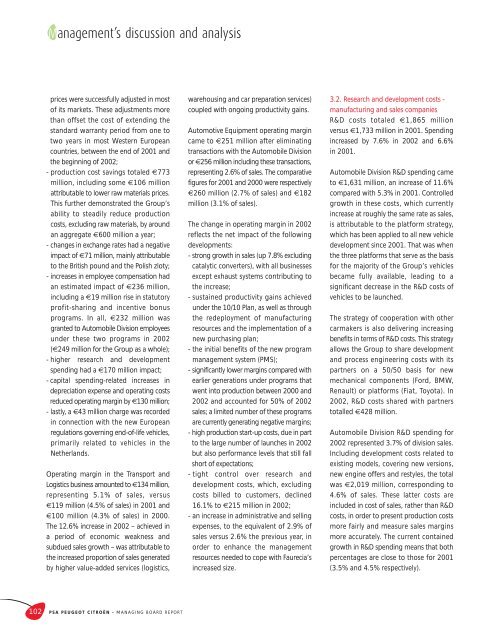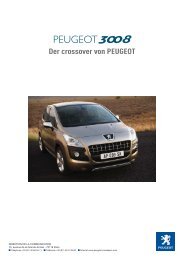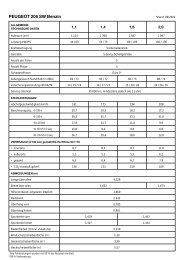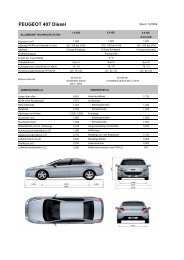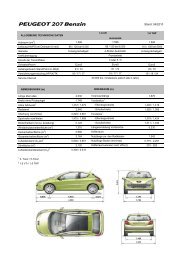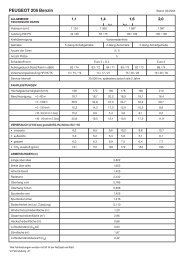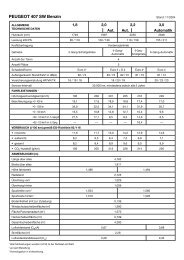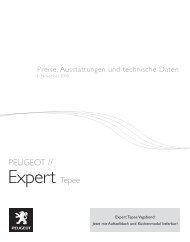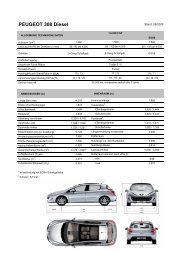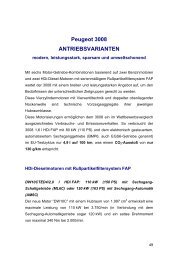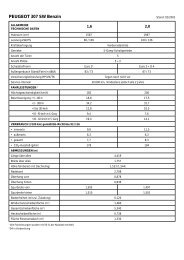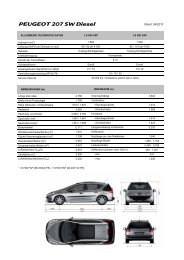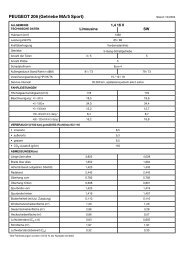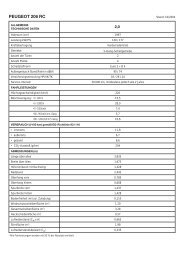PSA COUV page . page RA GB - PEUGEOT Presse
PSA COUV page . page RA GB - PEUGEOT Presse
PSA COUV page . page RA GB - PEUGEOT Presse
You also want an ePaper? Increase the reach of your titles
YUMPU automatically turns print PDFs into web optimized ePapers that Google loves.
Management’s discussion and analysis<br />
prices were successfully adjusted in most<br />
of its markets. These adjustments more<br />
than offset the cost of extending the<br />
standard warranty period from one to<br />
two years in most Western European<br />
countries, between the end of 2001 and<br />
the beginning of 2002;<br />
- production cost savings totaled €773<br />
million, including some €106 million<br />
attributable to lower raw materials prices.<br />
This further demonstrated the Group’s<br />
ability to steadily reduce production<br />
costs, excluding raw materials, by around<br />
an aggregate €600 million a year;<br />
- changes in exchange rates had a negative<br />
impact of €71 million, mainly attributable<br />
to the British pound and the Polish zloty;<br />
- increases in employee compensation had<br />
an estimated impact of €236 million,<br />
including a €19 million rise in statutory<br />
profit-sharing and incentive bonus<br />
programs. In all, €232 million was<br />
granted to Automobile Division employees<br />
under these two programs in 2002<br />
(€249 million for the Group as a whole);<br />
- higher research and development<br />
spending had a €170 million impact;<br />
- capital spending-related increases in<br />
depreciation expense and operating costs<br />
reduced operating margin by €130 million;<br />
- lastly, a €43 million charge was recorded<br />
in connection with the new European<br />
regulations governing end-of-life vehicles,<br />
primarily related to vehicles in the<br />
Netherlands.<br />
Operating margin in the Transport and<br />
Logistics business amounted to €134 million,<br />
representing 5.1% of sales, versus<br />
€119 million (4.5% of sales) in 2001 and<br />
€100 million (4.3% of sales) in 2000.<br />
The 12.6% increase in 2002 – achieved in<br />
a period of economic weakness and<br />
subdued sales growth – was attributable to<br />
the increased proportion of sales generated<br />
by higher value-added services (logistics,<br />
warehousing and car preparation services)<br />
coupled with ongoing productivity gains.<br />
Automotive Equipment operating margin<br />
came to €251 million after eliminating<br />
transactions with the Automobile Division<br />
or €256 million including these transactions,<br />
representing 2.6% of sales. The comparative<br />
figures for 2001 and 2000 were respectively<br />
€260 million (2.7% of sales) and €182<br />
million (3.1% of sales).<br />
The change in operating margin in 2002<br />
reflects the net impact of the following<br />
developments:<br />
- strong growth in sales (up 7.8% excluding<br />
catalytic converters), with all businesses<br />
except exhaust systems contributing to<br />
the increase;<br />
- sustained productivity gains achieved<br />
under the 10/10 Plan, as well as through<br />
the redeployment of manufacturing<br />
resources and the implementation of a<br />
new purchasing plan;<br />
- the initial benefits of the new program<br />
management system (PMS);<br />
- significantly lower margins compared with<br />
earlier generations under programs that<br />
went into production between 2000 and<br />
2002 and accounted for 50% of 2002<br />
sales; a limited number of these programs<br />
are currently generating negative margins;<br />
- high production start-up costs, due in part<br />
to the large number of launches in 2002<br />
but also performance levels that still fall<br />
short of expectations;<br />
- tight control over research and<br />
development costs, which, excluding<br />
costs billed to customers, declined<br />
16.1% to €215 million in 2002;<br />
- an increase in administrative and selling<br />
expenses, to the equivalent of 2.9% of<br />
sales versus 2.6% the previous year, in<br />
order to enhance the management<br />
resources needed to cope with Faurecia’s<br />
increased size.<br />
3.2. Research and development costs -<br />
manufacturing and sales companies<br />
R&D costs totaled €1,865 million<br />
versus €1,733 million in 2001. Spending<br />
increased by 7.6% in 2002 and 6.6%<br />
in 2001.<br />
Automobile Division R&D spending came<br />
to €1,631 million, an increase of 11.6%<br />
compared with 5.3% in 2001. Controlled<br />
growth in these costs, which currently<br />
increase at roughly the same rate as sales,<br />
is attributable to the platform strategy,<br />
which has been applied to all new vehicle<br />
development since 2001. That was when<br />
the three platforms that serve as the basis<br />
for the majority of the Group’s vehicles<br />
became fully available, leading to a<br />
significant decrease in the R&D costs of<br />
vehicles to be launched.<br />
The strategy of cooperation with other<br />
carmakers is also delivering increasing<br />
benefits in terms of R&D costs. This strategy<br />
allows the Group to share development<br />
and process engineering costs with its<br />
partners on a 50/50 basis for new<br />
mechanical components (Ford, BMW,<br />
Renault) or platforms (Fiat, Toyota). In<br />
2002, R&D costs shared with partners<br />
totalled €428 million.<br />
Automobile Division R&D spending for<br />
2002 represented 3.7% of division sales.<br />
Including development costs related to<br />
existing models, covering new versions,<br />
new engine offers and restyles, the total<br />
was €2,019 million, corresponding to<br />
4.6% of sales. These latter costs are<br />
included in cost of sales, rather than R&D<br />
costs, in order to present production costs<br />
more fairly and measure sales margins<br />
more accurately. The current contained<br />
growth in R&D spending means that both<br />
percentages are close to those for 2001<br />
(3.5% and 4.5% respectively).<br />
102<br />
<strong>PSA</strong> <strong>PEUGEOT</strong> CITROËN - MANAGING BOARD REPORT


